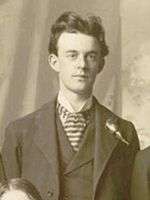John J. McClellan

John Jasper McClellan, Jr. (April 20, 1874 – August 2, 1925)[1] served as the chief organist of the organ in the Salt Lake Tabernacle of The Church of Jesus Christ of Latter-day Saints from 1900 to 1925.
McClellan was born in Payson, Utah Territory.[2] By the age of eleven McClellan was serving as a church organist in Payson. McClellan's father, also John J. McClellan, served as mayor of Payson from 1887 to 1890.[3]
In 1891, McClellan went to Saginaw, Michigan, where he studied under Albert W. Platte.[4] He then went to the Ann Arbor Conservatory, where he studied under Johann Erich Schmaal. He also studied with Alberto Jonas while there. He served as organist of St. Thomas Catholic Church while in Ann Arbor. He also served as pianist of the Ann Arbor Choral Union.[4]
In 1896, McClellan returned to Utah, where he taught music at LDS College and at Brigham Young Academy (the forerunner of Brigham Young University). It was during this time that McClellan married Mary Douglass. They eventually became the parents of five children.[2][4] He also served as the pianist for the Salt Lake Opera Company.
In 1899, McClellan went to Berlin, Germany, where he studied with Xaver Scharwenka and Ernest Jedliczka. While in Berlin, McClellan edited and published a new edition of the LDS hymnal in German.[4]
McClellan became the organist of the Salt Lake Tabernacle in 1900. In this capacity, he accompanied the Mormon Tabernacle Choir and inaugurated the free weekly organ recitals at the tabernacle.
In the 1985 English edition of the LDS hymnal, the music for "Sweet Is the Work" (hymn #147) was composed by McClellan.
McClellan was a member of the Church Music Committee of the LDS Church when it was first formed.[5]
Among those who studied under McClellan were Alexander Schreiner,[6] Sidney B. Sperry[7] and J. Spencer Cornwall.[2]
John Jasper McClellan has made the oldest organ recording that we know today on the organ at the Mormon Tabernacle in Salt Lake City. It was recorded on or about 1 September 1910. Where the Columbia Graphophone Company had transported equipment to record the famous choir. Two enormous acoustic recording horns, five feet long and two feet wide, were suspended on a rope strung across the Tabernacle. Although the engineer deemed the recordings successful, apparently they were never approved for release. Later, It can be heard on a 78 rpm plate from Columbia Recordings nr. 1704. This according to “The first recordings of organ music ever made” by John W. Landon (Theatre organ: Journal of the American Theatre Organ Society LIII/4 [July–August 2011] pp. 22–28).
References
- ↑ "Death Certificate". State of Utah. August 6, 1925. Retrieved 2009-12-14.
- 1 2 3 Cornwall, J. Spencer, Stories of Our Mormon Hymns. (Salt Lake City, Utah: Deseret Book, 1975) p. 186
- ↑ Jenson, Andrew. Encyclopedic History of the Church of Jesus Christ of Latter-day Saints (Salt Lake City, Utah: Deseret News Press, 1941) p. 644
- 1 2 3 4 Jenson, Andrew. Latter-day Saint Biographical Encyclopedia (Salt Lake City, Utah: Deseret News and A. Jenson Historical Company, 1901–1936) 1:747.
- ↑ Church News, 1990-09-08.
- ↑ Moody, Michael F. "Music" in Ludlow, Daniel H., ed., Encyclopedia of Mormonism. (New York: MacMillan, 1992) p. 977
- ↑ "Sidney B. Sperry: The Man, The Scholar and the Teacher" in Journal of Book of Mormon Studies, Vol. 4, no. 1 (Spring 1995) p. xiv
External links
- Free scores by John J. McClellan in the Choral Public Domain Library (ChoralWiki)